
- pwa@ucsd.edu
-
9500 Gilman Dr
La Jolla , California 92093
Professor and Chair

Patrick Anderson is a Professor in the departments of Communication, Ethnic Studies, and Critical Gender Studies at the University of California, San Diego, and a 2023 Guggenheim Fellow. He is the author of The Lamentations: A Requiem for Queer Suicide (Fordham 2024), Autobiography of a Disease (Routledge, 2017) and So Much Wasted (Duke University Press, 2010) and the co-editor, with Jisha Menon, of Violence Performed (Palgrave, 2009). With Nicholas Ridout, he co-edits the “Performance Works” book series at Northwestern University Press. He has served as Director of the Critical Gender Studies program and founding facilitator for the Social Justice Practicum at UC San Diego; as Vice President of the American Society for Theatre Research; and as Editorial Board member for the University of California Press. In 2018, he was appointed by the Mayor and City Council of San Diego to the Community Review Board on Police Practices (later the Commission on Police Practices), which represents the community in reviewing complaints against the police, officer-involved shootings, and in-custody deaths. He served for two full terms. A former Fulbright Scholar and Berkeley Fellow, Anderson holds a PhD in Performance Studies (Designated Emphasis: Women, Gender, and Sexuality) from the University of California, Berkeley; an MA in Communication and Cultural Studies from the University of North Carolina at Chapel Hill; and a BS in Performance Studies and Anthropology from Northwestern University. In 2020, he completed his Death Doula certification at the University of Vermont.
To learn more about Professor Anderson’s work, please visit the Research section of his personal site HERE.
Ph.D. (University of California, Berkeley) - Performance Studies;
Designated Emphasis in Women, Gender, and Sexuality
M.A. (University of North Carolina at Chapel Hill) - Communication Studies
and Cultural Studies
B.S. (Northwestern University) - Performance Studies and Anthropology